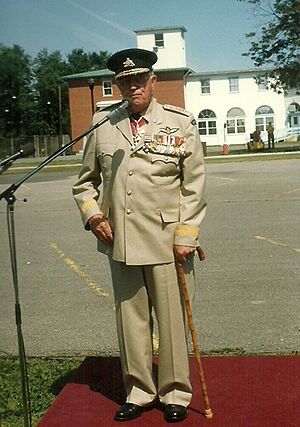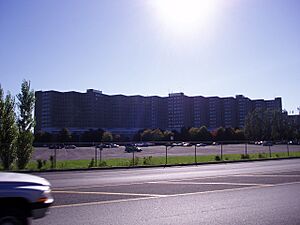Jean Victor Allard facts for kids
Quick facts for kids
Jean Victor Allard
|
|
|---|---|

General Jean Victor Allard, CDS
|
|
| Born | 12 June 1913 Sainte-Monique-de-Nicolet, Quebec |
| Died | 23 April 1996 (aged 82) Trois-Rivières, Quebec |
| Allegiance | |
| Service/ |
Canadian Army / Canadian Forces |
| Years of service | 1933–1969 |
| Rank | General |
| Commands held | Chief of the Defence Staff Commander, Mobile Command 25th Canadian Infantry Brigade 6th Canadian Infantry Brigade Royal 22e Régiment |
| Battles/wars | World War II Korean War |
| Awards | Companion of the Order of Canada Commander of the Order of the British Empire Grand Officer of the National Order of Quebec Distinguished Service Order & Two Bars |
| Other work | Inventor, diplomat, and amateur painter. |
General Jean Victor Allard (12 June 1913 – 23 April 1996) was a very important Canadian soldier. He was the first French Canadian to become the Chief of the Defence Staff, which is the highest military job in the Canadian Forces. He held this top position from 1966 to 1969. He was also the first French Canadian to reach the rank of General.
Contents
Military career
Early service and World War II
Before World War II started, Jean Victor Allard was an officer in the Régiment de Trois-Rivières. When the war began in 1939, he joined the Canadian Active Service Force. He was quickly promoted to the rank of major.
His regiment was changed into an English-speaking tank unit. So, he asked to join the infantry, which are foot soldiers. He became the Deputy Commanding Officer of the Régiment de la Chaudière in England. In December 1943, he took command of the famous Royal 22e Régiment in Italy.
By the end of the war in Germany, he was in charge of the 6th Canadian Infantry Brigade. His rank was brigadier, which is now called brigadier-general. He earned the Distinguished Service Order (DSO) three times for his bravery and leadership. This award is given for outstanding service during wartime. He received it first in April 1944, and then twice more in 1945.
Post-war and Korean War
After World War II, General Allard worked as a military attaché in Moscow until 1948. A military attaché is an expert who advises on military matters in another country. After this, he became the Commander for the East Quebec Area.
During the Korean War, he led the 25th Canadian Infantry Brigade starting in April 1953. He was the one who signed the truce for Canada at Panmunjon on 27 July 1953. This truce helped end the fighting in Korea.
Later, in 1954, he became the commander of the 3rd Canadian Infantry Brigade. In 1956, he again commanded the Eastern Quebec Area. By 1958, he was made Vice-Chief of the General Staff.
High command roles
As a major-general, he commanded the British 4th Division from 1961 to 1963. This was part of the British Army of the Rhine (BAOR). In 1964, he became the Chief of Operational Readiness.
As a lieutenant-general, he was the Commander, Mobile Command from 1965 to 1966. This role meant he was in charge of all Canadian land forces in Canada. It also included the air support forces at that time.
In July 1966, Allard was promoted to the highest rank, full general. From 1966 to 1969, he served as the Chief of the Defence Staff. This made him the head of all Canadian military forces.
General Allard also wrote his life story. His memoirs, or memories, were published in 1985. The English version, The memoirs of General Jean V. Allard, came out in 1988. He wrote it with Serge Bernier.
Honours and legacy
General Allard received many important awards for his long and brave service. These include:
- The Companion of the Order of Canada (C.C.), which is one of Canada's highest honours.
- The Commander of the Most Excellent Order of the British Empire (CBE).
- The Grand officier de l'Ordre national du Québec (GOQ).
- The Distinguished Service Order (DSO) with two bars, meaning he earned it three times.
The Général-Jean-Victor-Allard Building is named in honour of General Allard. This building is where the Canadian Forces Leadership and Recruit School is located. It helps train new soldiers and leaders for the Canadian military.
Images for kids
 | Laphonza Butler |
 | Daisy Bates |
 | Elizabeth Piper Ensley |



